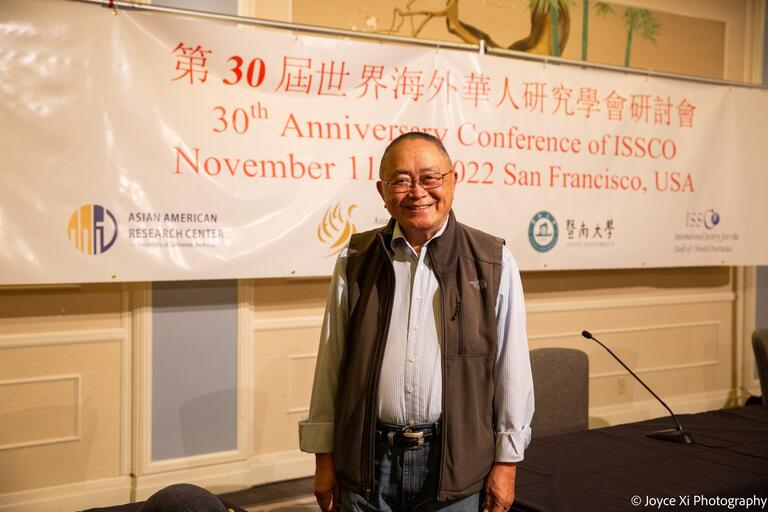30th Anniversary Conference of the founding of the International Society for the Study of Chinese Overseas (ISSCO)
世界海外华人研究学会
November 11-12, 2022
Kabuki Hotel, San Francisco, CA
 We emerge from the COVID-19 pandemic forever changed. The dramatic rise of anti- Chinese animus globally has shaken many diasporic communities to the core. The politicization of “the Chinese virus” has reignited Sinophobia and anti-Chinese racism, causing rampant and random cyber-bullying, verbal assault, and physical violence against Chinese and Chinese-looking people in the U.S. and in many countries throughout the world in magnitude and frequency not seen since the height of the Chinese exclusion period in the 19th century. This, in turn, has heightened social awareness among diasporic Chinese and revitalized political and cultural engagement on an unprecedented scale that crosses generations and national, linguistic, and class boundaries.
We emerge from the COVID-19 pandemic forever changed. The dramatic rise of anti- Chinese animus globally has shaken many diasporic communities to the core. The politicization of “the Chinese virus” has reignited Sinophobia and anti-Chinese racism, causing rampant and random cyber-bullying, verbal assault, and physical violence against Chinese and Chinese-looking people in the U.S. and in many countries throughout the world in magnitude and frequency not seen since the height of the Chinese exclusion period in the 19th century. This, in turn, has heightened social awareness among diasporic Chinese and revitalized political and cultural engagement on an unprecedented scale that crosses generations and national, linguistic, and class boundaries.
At the same time, the competition for economic and technological hegemony between a declining US and a rising China has reached new levels of intensity and, indeed, hostility that is forcing a planetary geopolitical realignment of nation-states that is reminiscent of the Cold War period, leading some political scientists to wonder if China and the U.S. have already reached the inevitable “Thucydides Trap.” This geopolitical Struggle between the US and China has had dire consequences on ethnic Chinese in the U.S. and across the globe. In an era when China once again is perceived as more threat than opportunity, ethnic Chinese—especially scientists, researchers, and entrepreneurs—have come under sweeping government surveillance and overzealous prosecution, undermining global collaboration legitimate international academic exchange and collaboration, and faith in democracy, racial equality, and the very system of justice.
Indeed, since the founding ISSCO conference in November 1992, we have witnessed many sweeping changes that have transformed the conditions of Chinese living in diaspora, including China’s rapid and formidable entry into global economics, the shifting perception of China from being a potential market for the West to an enemy of the West, and the increased emigration from China to different regions of the world, especially Africa, Latin America, Europe, and Oceania. All of this have unfolded within an emergent digital-technological world order that has dramatically transformed our habits of sociality and knowledge production. Indeed, the explosion of globalized media and digital platforms has expanded the possibilities for global communication, transnational meaning-making, and the proliferation of publics. All provide ample encouragement for diasporic cultural creativity and translocal social-political engagement, even as it makes possible the danger of misinformation and ideological manipulation.
Under these circumstances, how are diasporic Chinese experiencing and responding to the global pandemic and the international tensions? How are they imaging their possible futures under these changed conditions? What can we learn from previous moments of international engagement and Sinophobia in order to address the widespread uptick of anti-Chinese/anti-Asian hate and systemic racism, more broadly? What established forms and strategies of mutual aid can we modify, adapt, and forward in this current context? What kinds of trans-racial, trans-gender, trans-generational, and transnational collaborations, dialogues, and solidarities must we advance to create a future that is not just sustainable but full of possibilities? What kinds of histories, narratives, and imaginaries must we put forward to build our capacity for resilience, compassion, and care so that we can thrive collectively?
Official Languages of the Conference: English, Chinese, and Spanish
Sponsored by: Asian American Research Center and Asian American and Asian Diaspora Studies Program (AAADS), University of California, Berkeley; Jinan University, Guangdong, China; and Asia Pacific Center, UC Los Angeles
Co-sponsored by: Institute of East Asian Studies and Center for Chinese Studies, UC Berkeley
The conference was made possible thanks to generous support from:
Lawrence Choy Lowe Memorial Fund
Ricky Ho and Emily Leung



